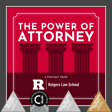
S4E11: Love Is Light, with Hon. Esther Salas RLAW'94
Hon. Esther Salas RLAW'94 joins Co-Dean Rose Cuison-Villazor to share her story of growing up in Union City, NJ, attending Rutgers Law School, and the work she is doing as a US District Court Judge for the District of New Jersey. She opens up about the tragedy that befell her family; the legacy of her son, Daniel Anderl; and the inspiration for the scholarships that have been formed in his name.
If you would like to donate to the Daniel Anderl Memorial Scholarship, please click here or visit go.rutgers.edu/DanielAnderlMemorialScholarship.
The Power of Attorney is produced by Rutgers Law School. With two locations minutes from Philadelphia and New York City, Rutgers Law offers the prestige and reputation of a large, nationally known university combined with a personal, small campus experience. Learn more by visiting law.rutgers.edu.
Production Manager: Shanida Carter
Series Producer & Editor: Nate Nakao
--- Send in a voice message: https://podcasters.spotify.com/pod/show/rutgerslaw/message

